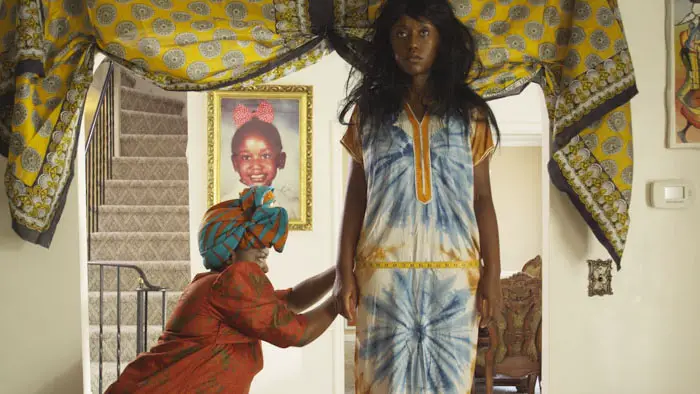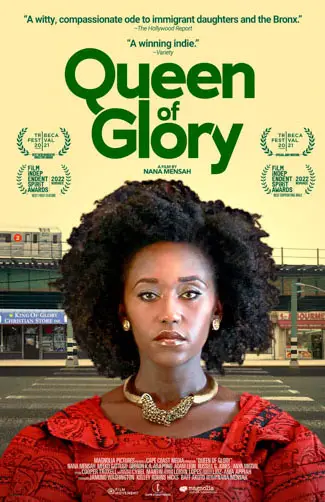
As immigrants to America, our stories are as similar as they are different. Nana Mensah’s Queen of Glory tells a unique and deeply personal account of an immigrant as well as a different take on being African-American.
Sarah (Nana Mensah), the daughter of Ghanaian immigrants, is currently working on her Ivy League Doctorate. Life couldn’t be better for her. She has a stable career and is working on her dissertation. She’ll soon be moving to Ohio with her boyfriend — who’s currently married (but he’ll break up soon, right?). Out of nowhere, Sarah receives news that her mother passed away and left Sarah her home in the Bronx and her Christian bookstore. Making matters worse, Sarah’s father, Godwin (Oberon K.A. Adjepong), moves in with her to help get her mother’s affairs in order and take care of the family and guests coming in for the funeral.
Wanting to wrap things up quickly, Sarah’s top priority is to sell the bookstore. It has only one employee, Pitt (Meeko), as with all the compassion in the world, Sarah’s mother was the only person willing to give the former convict a job. Pitt is an accomplished baker with his Bible cookies, which contains a magical ingredient that may or may not be weed. With weeks before she moves away with her married boyfriend, Sarah must sell the bookstore, fire Pitt, work out this friendship with her slightly racist neighbors, and organize a proper Ghanaian burial ceremony to please the elders.
Queen of Glory also explores all of Sarah’s daddy issues, which quickly rise to the top. She is still upset that Godwin left them to move back to Ghana, while Godwin thinks she’s wasting her time in the U.S. and insists she move back. There’s an incredible moment when Godwin realizes that Sarah is not a little girl anymore.

“…Sarah must sell the bookstore, fire Pitt, work out this friendship with her slightly racist neighbors, and organize a proper Ghanaian burial ceremony…”
Sarah’s arc is not your typical African-American tale. It’s refreshing to see the breadth of narratives of the immigrant and minority community, which don’t always feel so cookie-cutter. Depending on when one’s family arrived, the stories are always distinct, and the hope of what America offers is also viewed differently. Writer/director/star Mensah describes herself as the “hyphen” in African-American as she is a first-generation Ghanaian but very American in terms of her education and upbringing. Sarah’s mother was a devout Christian, and she is forced to learn lessons in compassion and forgiveness from her mother’s legacy. On her father’s side, he reminds Sarah of her heritage as she immerses herself in the Ghanaian traditions and rituals.
At the same time, Sarah is trying to find herself as an American and blends all three aspects of her parents and herself in the process. At first, she allowed herself to get caught up in the drama of life while pursuing the ambitions of the post-graduate degree she was chasing. Her mother’s death was the catalyst she needed to find the true Sarah.
No doubt, Queen of Glory has a very personal feel to its plotting. Mensah is absolutely brilliant as Sarah. Everything Mensah has to “say” about Sarah can be “seen” on the screen. Her path to self-discovery is played out brilliantly with very little dialogue in the ultimate display of “show, don’t tell.” Her take on the character is insightful and often humorous. The narrative is all in the performance and, at times, in some inventive storytelling devices with the camera. I’m referring to the dinner with her boyfriend and how everything you need to know is told in quick, silent flashbacks.
In her feature directorial debut, Mensah put her heart and experience out there on the big screen. With Queen of Glory, she brilliantly drives her narrative in subtle ways and uses the medium of film in ways you wouldn’t expect from a first-time filmmaker.
For screening information, visit the Queen of Glory page at Film Movement.

"…Mensah is absolutely brilliant as Sarah."


